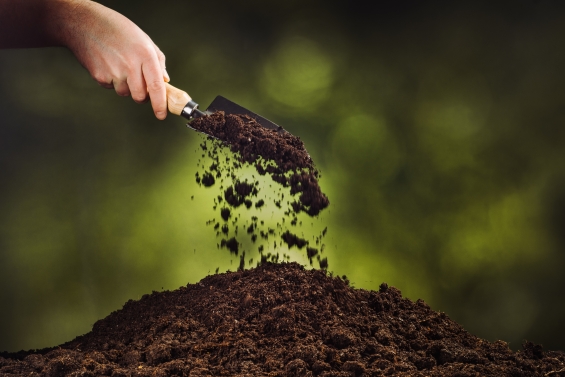Constantly various soil forming and structure affecting processes take place. Consumption of natural resources and constant usage of chemical substances started to interfere with natural soil processes cycle, therefore the soil started to degrade. At this time in the world there are only 40% of fertile land. Many farmers notice that mineral fertilisers are not as effective as before. The cause of inefficient fertilisers – soil degradation. Soil fertility is constantly reducing; thus, it can become very hard to feed rapidly growing population with naturally grown production.
Soil, similar to human organism, is full of beneficial bacteria, which is responsible for the activity of many soil processes. Due to negative factors good soil bacteria dies, therefore balance between the good and bad soil bacteria is damaged. It was noted that in some soil separate types of microorganisms are near to extinction and their place is taken by microorganisms, which are irregular for naturally occurring soil processes. This type of microorganisms, opposite to good soil bacteria, do not create symbiosis with plants, but parasite them at their root level. As a result, even under the additional plant nutrition, grown cultures cannot reveal their full productivity and potential. Moreover, more often it is encountered with various plant diseases, against which fungicide are not effective. In order to save harvest, people often increase chemical fertiliser norms, thus damaging soil even more…
What to do in such cases? First of all, it is essential to change the attitude towards workable soil. It is essential to understand that soil needs to be looked after responsibly: in case of taking nutrients away from the soil – try to return them back to the soil; in case of damaging natural soil microflora or structure – try to restore it by returning good and bad bacteria balance. Around 1000 years – this much time is needed to form 1 centimetre of cultivated soil. In the meantime, due to soil degradation around 30 football pitch size fields of fertile land is lost every minute. Previously, this problem was approached differently: by applying different agricultural strategies soil was supplemented with organic and mineral fertilisers. Despite this, the best way to protect the soil – stop impoverishing and maintain SUSTAINABLE AGRICULTURE principles.
The objective of sustainable agriculture – to get greater harvest, while at the same time reducing soil degradation. Sustainable agriculture is based on constant learning how to effectively maintain present soil, water and biological resources. By following this principle, aggressive soil cultivation is changed by a strategy when depleted soil is enriched with biologically active soil (probiotics) and the soil fertility is maintained by applying crop rotation, regulating top soil layer thickness.
Spring sowing is getting closer. We would like to invite to grow responsibly and do not deplete the soil. It is essential to start looking after the soil now, which will be used by the future generation. This can be done by anyone of us in garden, greenhouse or cultivated fields. Nord Organic offered organic blends Plant Probiotic and Soil Probiotic – natural products, created for increasing humus content, soil fertility restoration and soil degradation prevention. Inserted into the soil these blends bring needed nutrients, good bacteria and ensure natural and long-term fertilisation. By using these products, the main principle of sustainable agriculture is achieved – soil fertility is restored and grown healthy and natural products. In this way we not only take what is best, but also, we return!

